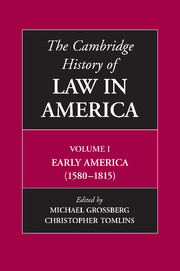Book contents
- Frontmatter
- 1 Law, Colonization, Legitimation, and the European Background
- 2 The Law of Native Americans, to 1815
- 3 English Settlement and Local Governance
- 4 Legal Communications and Imperial Governance: British North America and Spanish America Compared
- 5 Regionalism in Early American Law
- 6 Penality and the Colonial Project: Crime, Punishment, and the Regulation of Morals in Early America
- 7 Law, Population, Labor
- 8 The Fragmented Laws of Slavery in the Colonial and Revolutionary Eras
- 9 The Transformation of Domestic Law
- 10 Law and Religion in Colonial America
- 11 The Transformation of Law and Economy in Early America
- 12 Law and Commerce, 1580–1815
- 13 Law and the Origins of the American Revolution
- 14 Confederation and Constitution
- 15 The Consolidation of the Early Federal System, 1791–1812
- 16 Magistrates, Common Law Lawyers, Legislators: The Three Legal Systems of British America
- Bibliographic Essays
- Notes on Contributors
- Index
- References
14 - Confederation and Constitution
Published online by Cambridge University Press: 28 November 2008
- Frontmatter
- 1 Law, Colonization, Legitimation, and the European Background
- 2 The Law of Native Americans, to 1815
- 3 English Settlement and Local Governance
- 4 Legal Communications and Imperial Governance: British North America and Spanish America Compared
- 5 Regionalism in Early American Law
- 6 Penality and the Colonial Project: Crime, Punishment, and the Regulation of Morals in Early America
- 7 Law, Population, Labor
- 8 The Fragmented Laws of Slavery in the Colonial and Revolutionary Eras
- 9 The Transformation of Domestic Law
- 10 Law and Religion in Colonial America
- 11 The Transformation of Law and Economy in Early America
- 12 Law and Commerce, 1580–1815
- 13 Law and the Origins of the American Revolution
- 14 Confederation and Constitution
- 15 The Consolidation of the Early Federal System, 1791–1812
- 16 Magistrates, Common Law Lawyers, Legislators: The Three Legal Systems of British America
- Bibliographic Essays
- Notes on Contributors
- Index
- References
Summary
In both its origins and principal consequences, the American Revolution was a profoundly constitutional phenomenon. It began in the mid-1760s as a characteristically Anglo-American dispute over the extent of the rights of self-government that the colonies could claim in the face of new assertions of Parliament’s legislative jurisdiction over America. When the ensuing dispute proved irresolvable, Americans declared their political independence from Britain and simultaneously embarked on a radical experiment in constitution-making that thereafter distinguished their ideas and practices of governance from those they had once shared with the mother country. A decade later, dissatisfaction with the state and federal constitutions adopted in the mid-1770s led to the calling of the Federal Convention that met at Philadelphia in May 1787. The new Constitution it proposed after four months of strenuous deliberation reflected a careful reconsideration of what one of its leading authors, James Madison, called “the vices of the political system of the United States,” vices that had become evident only through the experience of self-government since 1776. The ensuing struggle over its ratification in turn gave rise to an extended public debate that revealed how far some Americans had moved in their thinking over the previous decade and how closely others adhered to beliefs that had led the colonists to revolt in 1776.
- Type
- Chapter
- Information
- The Cambridge History of Law in America , pp. 482 - 517Publisher: Cambridge University PressPrint publication year: 2008
References
- 2
- Cited by



